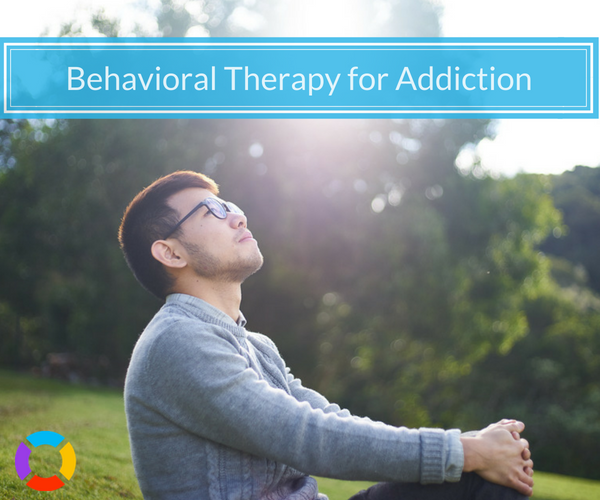Explore the Best Drug Addiction Therapy Options + Take the Free Quiz to Find Yours

Therapy is just talking, right? Not exactly. It’s actually a strategic way to change behavior, and it’s key to successful addiction recovery. But not everyone responds the same to the various types of addiction therapy.
Use this resource to learn about your therapy options and discover the best method for you.
What is Addiction Therapy and Why Is It Needed?
Engaging in individual therapy is more than “just talking.” It helps get to the root cause of your problems associated with substance use and other co-occurring disorders.
During therapy, you will engage in evidence-based practices. The purpose of this addiction therapy is not only to reduce or stop alcohol and drug use, but it also aims to achieve long-term sobriety.
You will learn to identify triggers and coping skills as well as learn how to have positive relationships with friends, family, and the world around you.
Not sure which type of addiction therapy is the best fit for you?
Take this quiz to discover Which Therapy Is Right For Me?
How Therapy Supports Lasting Recovery
Therapy is often a part of the treatment process when addressing substance use disorders. In most, if not all, treatment settings such as detox or inpatient treatment you will have the opportunity to engage in therapy.
Therapy offers many benefits to help move you in the right direction for your recovery. Topics addressed in therapy can be geared toward making positive behavioral changes in your life as well as learning life skills to be successful.
Therapy can help teach you healthy habits that support your recovery journey.
Benefits of Recovery Therapy
- Relapse prevention
- Life skills development
- Emotional processing
- Behavioral change
Not sure how addiction therapy can help you? Call today.
Types of Therapy for Alcohol & Drug Addiction
There are many types of therapy options that treat alcohol and drug addiction as well as co-occurring disorders. Each of these modalities offers different benefits and can be catered to your specific needs.
Following are some of the most common types of therapy used in treatment:
Cognitive Behavioral Therapy (CBT)
CBT is often used to change your negative thought patterns into something more positive. This type of therapy helps you identify your fears instead of avoiding them. CBT also helps you focus on relaxation techniques to calm your mind.
Dialectical Behavior Therapy (DBT)
DBT focuses on emotions and incorporates four basic principles: mindfulness, interpersonal effectiveness, emotional regulation, and distress tolerance.
DBT for alcohol and drug addiction treats relapse as a problem to solve. You will assess your relapse(s) and work on how to repair them as well as identify the harm it causes yourself and those around you.
Contingency Management
Contingency management therapy is considered a form of behavioral therapy. With this modality, you are rewarded for making positive behavioral changes.
As an example in addiction treatment, urine samples are often collected. When using contingency management, for every negative drug screen you could be given some form of prize or incentive for maintaining sobriety.
Motivational Enhancement Therapy (MET)
MET helps you identify and resolve ambivalence regarding your substance use issues. This type of therapy focuses on motivating you through open-ended questions and helping you set goals for yourself.
Motivational therapy for addiction emphasizes four key components: empathy, developing discrepancies, rolling with resistance, and developing autonomy/self-efficacy.
Have more questions about addiction therapy? Call now for answers.
12 Step Facilitation
This type of therapy is considered community-based due to the way it is structured. It promotes engagement in meetings like NA and AA as well as linking you to additional resources. This method can also encourage group therapy for addiction.
Family and Couples Therapy
Family and couples therapy can be an important component in your recovery journey.
It can help your loved ones understand your addiction on a deeper level and provide ways for them to help you through it. Family therapy for addiction also gives family members a safe space to address their thoughts, feelings, and emotions.
Group Therapy
Addiction group therapy gives you a chance to connect with others who are dealing with similar issues. There are a variety of group therapy topics that can be addressed in group therapy that focus on moving through recovery.
Experiential Therapy
Experiential therapy for addiction is considered a “non-traditional” method of treatment when it comes to addressing alcohol and drug use. You are put in settings or complete activities that help you feel comfortable with a therapist. This can include being outdoors or engaging in music or art therapy.
Biofeedback Therapy
Biofeedback therapyhelps treat symptoms of withdrawal such as anxiety, chronic pain, and restlessness. Biofeedback machines record bodily functions related to detox or withdrawal and display them back to you. This will help you identify how addiction impacts your body.
Faith-based Therapy
This type of therapy incorporates Christian or other faith-based values into treatment. It offers a connection to a higher power or being. Faith and spirituality can hold such power in people’s lives, which is why faith-based therapy can be beneficial for those seeking this specific modality.
Holistic Based Therapy
Holistic therapy is an alternative method of treatment to address substance use disorders. It incorporates practices that focus on mind, body, and spirit, such as meditation and breathwork.
How to Know Which Therapy is Right for You
Therapy is a personal and vulnerable experience. It is best to find both a provider and agency that best fits your needs and values. This goes beyond location, or simply finding “addiction therapy near me.”
While location can be important, it is also important to consider finding programs that address co-occurring issues like depression or anxiety if that is something you are also dealing with alongside addiction.
You can also talk with a provider to see what types of services they offer or their specialities to make sure it aligns with what you are wanting and needing at this time.
To help you get started, here is a quick quiz to reveal what forms of therapy might be most beneficial for you.
Take our free quiz: Which Addiction Therapy Is Right for You?
Inpatient vs. Outpatient Options
Inpatient and outpatient treatment each offer unique advantages.
If you are struggling with addiction and are having a hard time maintaining sobriety, then you might consider getting into inpatient drug abuse treatment. This is where you live on site and receive 24/7 support. Services can include individual and group therapy. In some cases, you might be required to complete a detox program prior to starting inpatient treatment.
Outpatient services can be considered a “step down” service when discharging from inpatient treatment. However, some individuals go straight into this level of care without needing any other forms of treatment.
Outpatient therapy typically includes the same types of treatment as inpatient services, but you are living in the community while receiving treatment. This format provides less supervision and greater flexibility, which makes it suitable for those who need to maintain other obligations and require less intensive care.
Need help choosing the right therapy for you? Call today.
How Long Does Addiction Therapy Last?
Individuals who can commit to longer treatment typically experience better outcomes. This longer duration allows more time for participants to develop recovery skills and truly get the support they need for long-term sobriety.
As for therapy duration, addiction treatment usually lasts 30, 60, or 90 days depending on your specific needs and issues. These time frames are primarily found in inpatient programs. If you are in outpatient services, there might be a less specific recovery timeline.
In some cases, you could be residing in a sober-living or halfway residence while engaging in treatment and may stay there for months after treatment ends. You could also engage in community programs such as NA/AA meetings, and those do not necessarily have a specific end date.
It is important to consider what would lead you to having the most success when choosing your treatment path. Sometimes 30 days works for one person, but it might not work for you. Think of this in terms of journey rather than destination.
Therapy + Medication: When Both Are Needed
In some cases, therapy and medication are needed at the same time, especially for those struggling with opioid and alcohol use. In these cases, therapy and medication can go hand-in-hand. This is known as medication assisted treatment (MAT).
MAT is considered a comprehensive approach to treatment, as it addresses both the physical and psychological sides of addiction. It is important that you engage in therapy with this service to get the full benefit.
The medication for addiction recovery curbs your cravings, and the therapy addresses the emotions behind your use as well as helps you learn healthy coping skills and techniques for change.
How to Find Addiction Therapy Near You
Finding a treatment program that best fits your specific needs is the most important step to take when seeking services. There are many different treatment centers across the United States that can provide quality support.
As you search, use these tips to find a program or therapist for addiction.
- Consider insurance. Do they accept your insurance plan? What out-of-pocket expenses or deductibles apply?
- Explore payment options. Do they offer scholarships or grants? Payment plans? Discounts based on income?
- Verify credentials. Is the facility accredited by CARF or The Joint Commission? Are they licensed by the state? What training/education have their therapists completed?
- Align expectations. Do you have specific needs or desire specialized treatment? Look for programs that offer men-only, women-only, dual diagnosis or other targeted programs that will meet your expectations for care.
FAQs: Common Questions about Therapy for Addiction
Have more addiction treatment questions? Use these therapy for addiction FAQs to learn more.
Yes, therapy can help with addiction. Addiction therapy gives you a chance to explore your substance use in a different, more personal way. Through therapy, you learn coping skills to live a sober life. You receive emotional support from a therapist or counselor as well as support from peers in group therapy sessions.
Cognitive behavioral therapy (CBT) is considered to be the most effective addiction therapy. CBT helps you address your thoughts and feelings that are contributing to substance abuse. You will cover topics such as stress management and relaxation when engaging in CBT. It offers a goal-oriented approach.
Medication assisted treatment typically includes therapy. This provides comprehensive treatment to address both your physical and psychological needs.
While not everyone who is on medication attends therapy, you might want to consider it. Medications help manage symptoms, whereas in therapy you are learning ways to make behavioral changes in your life.
Change doesn’t happen overnight, but you will start noticing mood changes, feeling better about yourself, and realizing you can cope with your life in a more positive way. Regarding substance use disorders, you may start to notice that you are cutting back your use or stopping completely.



